深圳中学Unit 5 Section A 1a~2d课件 -2024-2025学年人教版英语八年级下册
文档属性
| 名称 | 深圳中学Unit 5 Section A 1a~2d课件 -2024-2025学年人教版英语八年级下册 |

|
|
| 格式 | pptx | ||
| 文件大小 | 28.4MB | ||
| 资源类型 | 试卷 | ||
| 版本资源 | 人教新目标(Go for it)版 | ||
| 科目 | 英语 | ||
| 更新时间 | 2025-04-09 00:00:00 | ||
图片预览

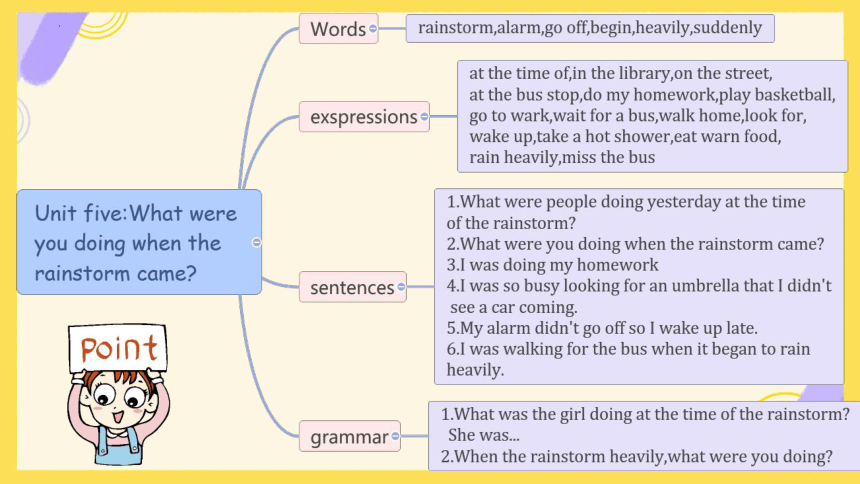
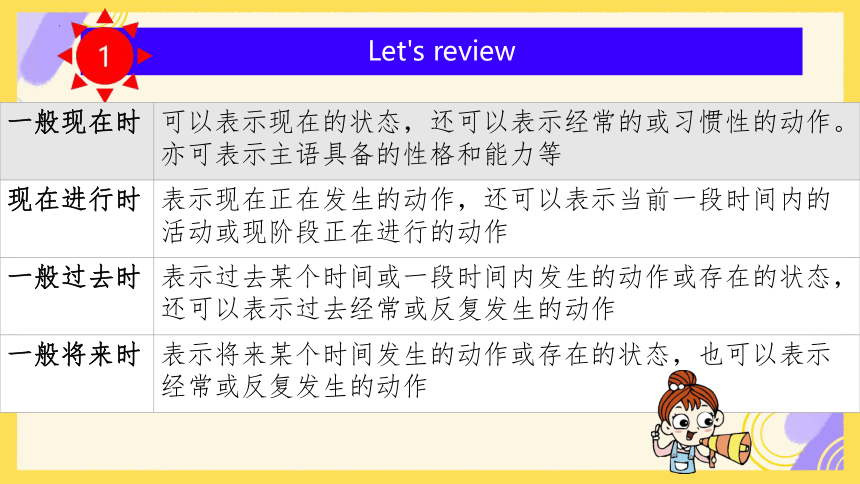
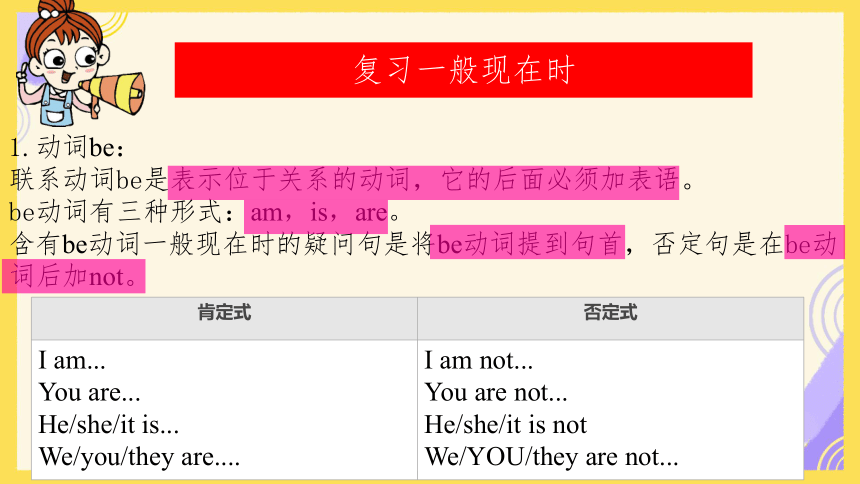
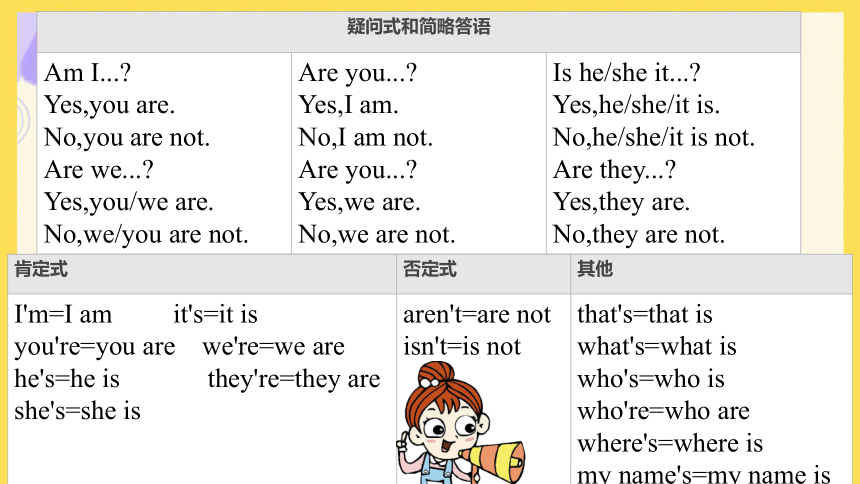


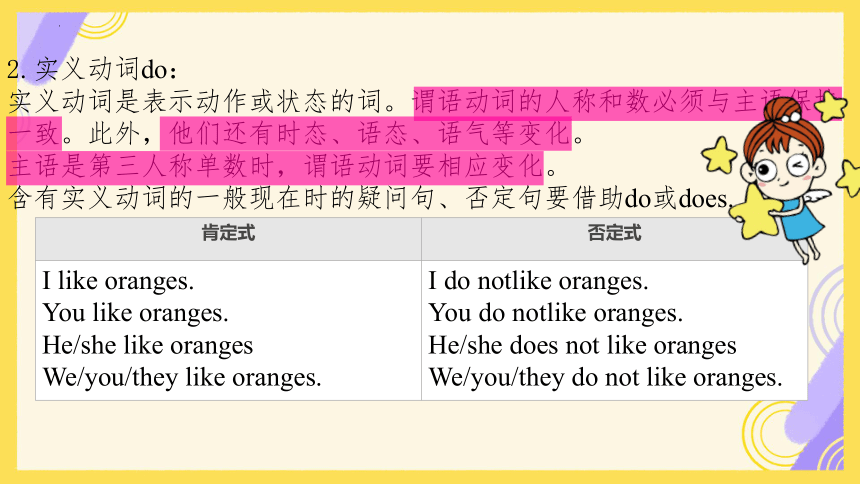
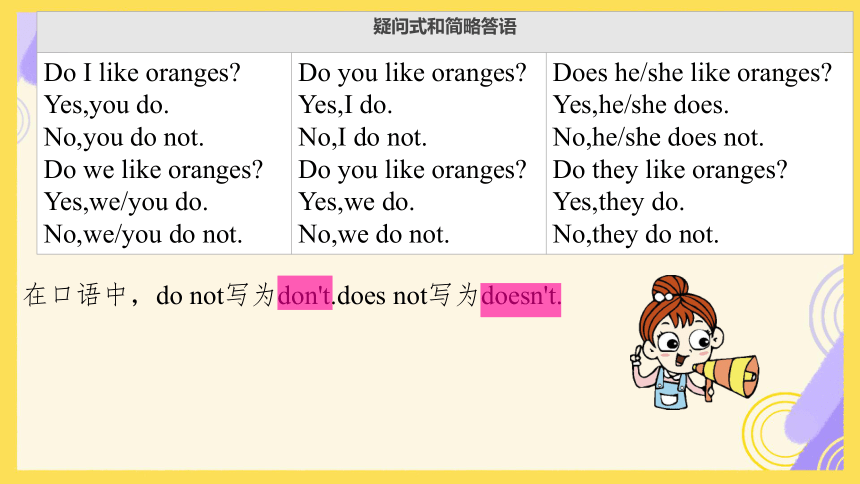

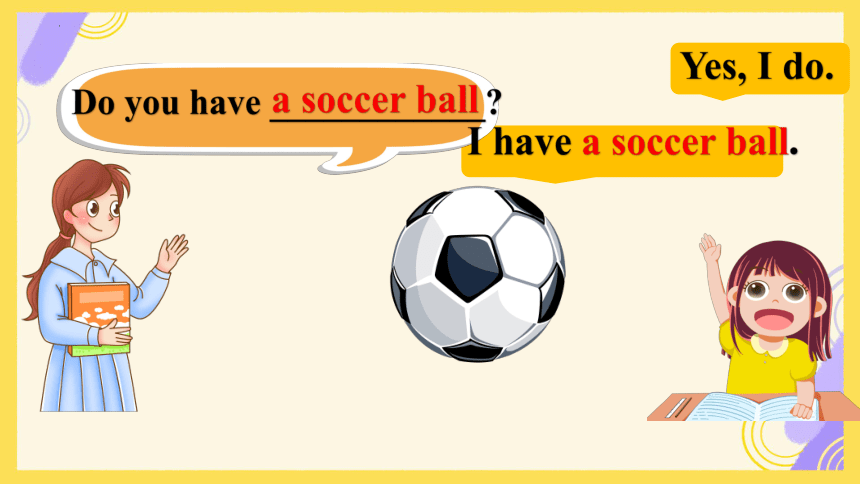
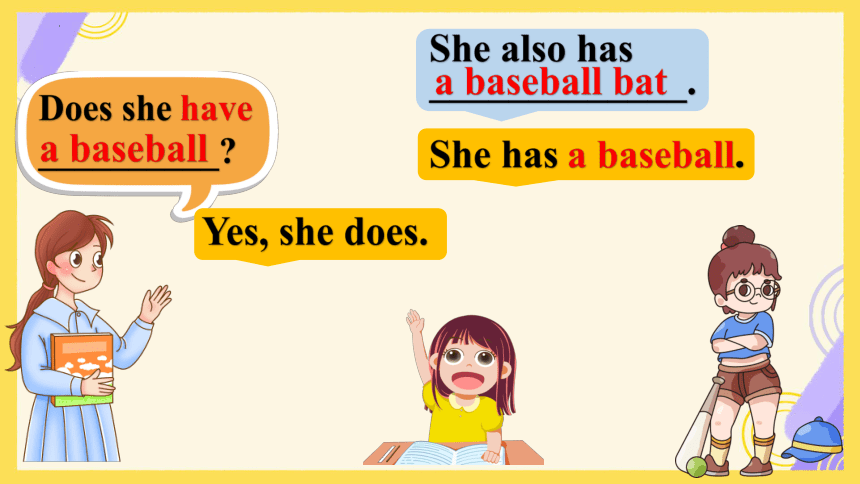
文档简介
(共79张PPT)
Section A 1a-2d
Unit 5
What were you doing when the rainstorm came
Let's review
一般现在时 可以表示现在的状态,还可以表示经常的或习惯性的动作。亦可表示主语具备的性格和能力等
现在进行时 表示现在正在发生的动作,还可以表示当前一段时间内的活动或现阶段正在进行的动作
一般过去时 表示过去某个时间或一段时间内发生的动作或存在的状态,还可以表示过去经常或反复发生的动作
一般将来时 表示将来某个时间发生的动作或存在的状态,也可以表示经常或反复发生的动作
复习一般现在时
1.动词be:
联系动词be是表示位于关系的动词,它的后面必须加表语。
be动词有三种形式:am,is,are。
含有be动词一般现在时的疑问句是将be动词提到句首,否定句是在be动词后加not。
肯定式 否定式
I am... You are... He/she/it is... We/you/they are.... I am not...
You are not...
He/she/it is not
We/YOU/they are not...
疑问式和简略答语 Am I... Yes,you are. No,you are not. Are we... Yes,you/we are. No,we/you are not. Are you... Yes,I am. No,I am not. Are you... Yes,we are. No,we are not. Is he/she it...
Yes,he/she/it is.
No,he/she/it is not.
Are they...
Yes,they are.
No,they are not.
肯定式 否定式 其他
I'm=I am it's=it is you're=you are we're=we are he's=he is they're=they are she's=she is aren't=are not isn't=is not that's=that is
what's=what is
who's=who is
who're=who are
where's=where is
my name's=my name is
Cindy
Dale
Are you Dale
Yes, I am.
Are you Gina
No, I’m not.
I’m Cindy.
Is he Bob
Yes, he is.
Is she
Amy
No, she isn’t.
She’s Linda.
Bob
Linda
2.实义动词do:
实义动词是表示动作或状态的词。谓语动词的人称和数必须与主语保持一致。此外,他们还有时态、语态、语气等变化。
主语是第三人称单数时,谓语动词要相应变化。
含有实义动词的一般现在时的疑问句、否定句要借助do或does.
肯定式 否定式
I like oranges. You like oranges. He/she like oranges We/you/they like oranges. I do notlike oranges.
You do notlike oranges.
He/she does not like oranges
We/you/they do not like oranges.
疑问式和简略答语 Do I like oranges Yes,you do. No,you do not. Do we like oranges Yes,we/you do. No,we/you do not. Do you like oranges Yes,I do. No,I do not. Do you like oranges Yes,we do. No,we do not. Does he/she like oranges
Yes,he/she does.
No,he/she does not.
Do they like oranges
Yes,they do.
No,they do not.
在口语中,do not写为don't.does not写为doesn't.
No, you don’t.
You don’t have
a basketball.
Do I have __________
a basket
a basketball
I have a soccer ball.
Do you have ____________
Yes, I do.
a soccer ball
She has a baseball.
She also has
_____________.
Does she have
__________
Yes, she does.
a baseball
a baseball bat
He has a ping-pong ball and a ____________.
Does he have
__________
Yes, he does.
a ping-pong ball
ping-pong bat
They have a volleyball.
Do they have
__________
Yes, they do.
a volleyball
Do you like oranges
Yes, I do. / No, I don't.
Does he like apples
Yes, he does. /No, he doesn't.
Does she like bananas
Yes, she does. /No, she doesn't.
Do they like pears
Yes, they do. /No, they don't.
复习现在进行时
现在进行时是由be( am,is,are)加- ing形式构成的。
肯定式 否定式
I am working. She/he is working. We/you/they are working. I am not working.
He/she is not working.
We/you/they are not working.
疑问式和简略答语 Am I working Yes,you are. No,you aren't Are we working Yes,we/you are. No,we/you aren't. Are you working
Yes,I am.
No,I'm not
疑问式和简略答语 Are you working Yes,we are. No,you aren't. Is he/she working Yes,she/he is. No,he/she isn't. Are they working
Yes,thry are.
No,they aren't.
What is she doing now
She is reading a book.
What are you doing now
We are having English now.
What's she doing
She is washing dishes.
A: What are they doing
B: They are dancing.
A: What are you doing
B: you are exercising.
复习一般过去时
动词 肯定式 否定式
be I/She/He was at home yesterday. We/You/They were at home yesterday. I/She/He wasn't at home yesterday.
We/You/They weren't at home yesterday.
work I/You/He/She/We/They worked in a hospital last year. I/You/He/She/We/They didn't work in a hospital last year.
动词 疑问式或简略答语 be Was I late yesterday Yes,you were. No,you weren't. Were you late yesterday Yes,I was. No,I wasn't. Was he/she late yesterday
Yes,hs/she was.
No,he/she wasn't.
Were we early yesterday Yes,you/they were. No,you/they weren't. Were you early yesterday Yes,we were. No,we weren't. Were they early yesterday
Yes,they were.
No,they weren't.
work Did I work last week Yes,you did No,you didn't. Did you work last week Yes,I did. No,I didn't. Did he/she work last week
Yes,he/she did.
No,he/she didn't.
Did we work last week Yes,we/you did. No,we/you didn't. Did you work last week Yes,we did. No,we didn't. Did they work last week
Yes,they did.
No,they didn't.
I did my homework last weekend.
What did you do last weekend
What did they do last weekend
They saw a film last weekend.
He went boating last weekend.
What did he do last weekend
We stayed by the lake boating last weekend.
What did we do last weekend
She played badminton last weekend.
What did she do last weekend
I studied for the English test last weekend.
What did you do last weekend
I went to New York City.
I went to the beach.
I visited museums.
I visited my uncle.
Where did you go on vacation
I went to a summer camp.
Where did he go on vacation
复习一般将来时
一般将来时“助动词+动词原形”
We will come to see you next week.
In the future,there will be less fresh water.
Will people use money in 100 years
How will the world be different in the future
1.在口语中,will常缩写为'll,will not缩写为won't.
2.在表示“带愿意色彩的将来”时,常用助动词will。
3.在疑问句中,主语为第一人称时,常用助动词shall。
4.在书面语中,主语为第一人称时,也常用助动词shall。
5.“be going to do”也可以表示将要发生的动作安排,或打算、计划、决定要做某事
What do you want to be when you grow up
How are you going to do that
I want to be a scientist.
I’m going to study science hard.
I will go to Science and Technology College.
I’m interested in robots. I’ll invent many robots.
What will your life be like in 100 years Can you say any sentences
People will have robots in their homes.
There will be only one country.
FREE
People won’t use money. Everything will be free.
Books will only be on computers, not on paper.
Kids won’t go to school. They’ll study at home on computers.
People will live to be 200 years old.
I think there will be more tall buildings, and there will be fewer cars and more buses.
There will be more trees and flowers. The air will be cleaner. The skies will be bluer.
There will be more people. People will live under the sea. There will be less water. Robots will do most of the heavy work. People will have more free time.
认识过去进行时
1.定义:表示过去某个具体时刻或某个时间内正在进行或发生的动作。
2.结构:was/were+动词-ing形式
3.常用时间状语:this morning,the whole morning,all day yesterday,at 8:00 last evening,at this time yesterday等。
4.基本句式:
肯定句 主语+was/were+V-ing形式+其他
否定句 主语+wasn't/weren't+V-ing形式+其他
一般疑问句 Was/Were+主语+V-ing形式+其他?
肯定回答:Yes,主语+was/were.否定回答:No,主语+wasn't/weren't
I was having dinner at eight yesterday evening.
We weren't watching TV from seven to nine last night.
Was Tom reading a book all the evening
5.过去进行时与一般过去时的区别:过去进行时强调动作在过去某个时刻正在进行或持续,一般过去时表示在过去的时间动作的完成
He was writing his composition last night.
He wrote his composition last night.
when和while的区别
when和while都可以用作连词,意为“当......时候”都可以用来引导时间状语从句。
1.when的用法
(1)when既可以指时间点也可以只时间段,从句的谓语动词可以是连续性的,也可以是非连续性的。
It was raining hard when we arrived.( arrived为短暂性动作,从句要用when,不要while)。
(2)when引导的从句的谓语动词可在主语谓语之前、之后或之间发生
While/When we were talking,the teacher came in.(talking和came同时发生)
When they arrived at the station,the train had left.(left发生在arrived之前)。
(3)当主语是一般将来时,从句用一般现在时表将来。
He will call me when he arrives in Shanghai.
2.while的用法
(1)while只时间段,其从句的谓语动词是非连续性的。
While/When he was reading,the telephone rang.(reading这一动做最具有连续性,用when和while均可)。
(2)强调主从句动作同时发生,主从句通常都用进行时。
I was writing a letter while my father was reading a newsaper.
如果现在进行时学好了———过去进行时 So easy!
不信?走着瞧!
What is she doing
She is reading a book.
was
was
初次品味
What are they doing
They are dancing.
They are watching TV.
were
were
What is the boy doing
He is doing his homework.
was
was
细细思考
What was he doing at 10 yesterday morning
What is he doing now
He is washing the clothes.
He was washing the clothes.
What are they doing now
They are having an English class.
What were they doing at this time yesterday
They were playing basketball at this time yesterday.
What was she doing when the rainstorm came
She was sweeping the floor.
What were they doing when the rainstorm came
They were cooking.
Let's learn
Section
A.
lANGUAGE GOALS:
Talk about the past events ;tell a story.
谈论过去的事情,讲故事。
1a
Where were the people at the tie of the rainstorm Match the statements with the people in the picture.
1.____I was in the library
2.____I was in my house
3.____I was on the street
4.____I was at the bus stop
b
a
d
c
What were people doing yesterday at the time of the rainstorm
在......时候
不可数名词
Pairwork
Ask and answer in pairs.
What was she/he doing when the rainstorm came
What were they doing when the rainstorm came
试一试
1b
Listen to the TVreport and circle the correct responses.
doing my homework/ studying
playing basketball/reading
going to work/waiting for a bus
walking home/
shopping
Memory Challenge
were
doing
was doing my homework
was reading
was waiting for the bus
was walking home
Gril doing her homework
Boy redaing
Woman waiting for a bus
Man walking home
Listen again and answer the following questions.
1.What's the weather like today
2.How was the rainsrorm yesterday
3.Why did it take many people hours to get home
The weather is beautiful today.
It was the heaviest one so for this year.
Because many people were caught in the rainstorm yesterday.
[in the studio]
Reporter:The weather is beautiful today.But yesterday's rainstorm was the heaviest one so far this year.So, what were people doing yesterday at the time of the rainstorm
[outside the studio,on the street.]
Girl:I was at home doing my homework.But I could hear the rain against my bedroom.
Boy:I was reading at the library after school.I'm so glad I didn't decide to play basketball.
Woman:I was waiting for a bus after work.Then the rain suddenly started and I got all wet.
Man:I was walking home from the supermarket. Luckily,I had an umbrella,but I still got wet!
[back in the studio]
Reporter:Looks like many people were caught in the rain yesterday.Many took hours to get home.
最高级前加定冠词the
至今,目前为止。也可以与现在完成时态中
当时正在
做我的家庭作业
against修饰rain,但是不能用strong来修饰
读书
决定做某事
等待公共汽车
回家
被雨淋。were/was+过去分词表被动
花费几小时
1c
Talk about what the people in 1a were doing at the time of the rainstorm.
What was the girl doing at the time of the rainstorm
She was doing her homework.
What was the boy doing at the time of the rainstorm
He was reading in the library.
What was the man doing at the time of the rainstorm
He was walking home.
What was the woman doing at the time of the rainstorm
She was waiting for a bus.
Mike
What was Mike doing at the time of the rainstorm
He was eating.
Molley
What was Molly doing at the time of the rainstorm
She was doing the dishes.
Jim
What was Jim doing at the time of the rainstorm
He was sleeping.
Mario
What was Mario doing at the time of the rainstorm
He was sweeping the floor.
Alan
What was Alan doing at the time of the rainstorm
He was taking a shower.
Marry
What was Marry doing at the time of the rainstorm
She was helping her mom.
Ben
What was Ben doing at the time of the rainstorm
He was playing basketball.
Listen and number the picture [1-5]
2a
4
2
1
5
3
Listen again.Fill the blanks in the sentence in2a
2b
4
2
1
5
3
I ___________so busy __________for the umbrella that I didn't see a car coming.
My alarm didn't go off so I ________up late.
I took a hot shower and__________some warm food.
I_____________for the bus when it began to rain heavily.
I__________to the bus stop but still missed the bus.
was
looking
woke
ate
was waiting
ran
醒来
如此,以至于
see sb./sth doing sth.
发出响声
寻找
洗一个热水澡
吃一些暖和的食物
heavily修饰rain
错过
Boy: Yesterday was a terrible day.My alarm didn't go off so I woke up lake.It was seven thirty when I woke up.And I needed to be at school by eight!I ran to the bus stop...but, I still missed the bus.It was eight thirty when I got to school.My teacher was angry and I felt bad all day.At four thirty,it was time to go home.It was walking for the bus when...all of sudden...it began to rain heavily.It was like... a really crazy rainstorm!I thought I had an umbrella in my schoolbag,so I kept trying to look for it.I was so busy looking for the umbrella that I didn't see a car coming.And it got water all over me!I was waiting like that...compelety wet...for maybe almost an hour.Finally,the bus came and brought me home.I took a hot shower and ate some warm food.It felt so good to be home!
需要
八点之前
一天
现在是...的时间
=suddenly
开始
粗狂
Keep doing sth.
try to do
查找
几乎
Listen again.Fill the blanks in the sentence in2a
2b
4
2
1
5
3
I ___________so busy __________for the umbrella that I didn't see a car coming.
My alarm didn't go off so I ________up late.
I took a hot shower and__________some warm food.
I_____________for the bus when it began to rain heavily.
I__________to the bus stop but still missed the bus.
was
looking
woke
ate
was waiting
ran
醒来
如此,以至于
see sb./sth doing sth.
发出响声
寻找
洗一个热水澡
吃一些暖和的食物
heavily修饰rain
错过
Look at the statements below.Are they true or false
1. The boy didn't wake up until 7:30 because his alarm didn't work.
2. He arrived at school at eight.
3.He still didn't catch the bus although he ran to the bus stop.
4.While he was waiting for the bus ,it suddenly started to rain heavily.
5.While he was busy looking for the umbrella in his schoolbag,
T
F
T
T
T
1
My alarm didn't go off so I woke up late.我的闹钟没响,所以我醒晚了。
go off意为“(闹钟)发出的响声”,为不及物动词短语,其后不可加宾语。
Did the clock go off
go off还可意为“离开(由指去做某事)”
She went off to get a drink.
与of相关联的词语还有:
put off推迟take off脱下,起飞cut off切掉;剪掉
When my mother come to into my mom.I was just lying in my bed and waiting for the alarm to___
A.put off B.take off C.turn off D.go off
2
I was waiting for the bus when it began to rain heavily.当开始下大雨时,我正在等公共汽车。
(1)begin做及物动词,意为“开始”,其后可接名词、动词不定式、代词或动词-ing形式作宾语,其过去时为began,过去分词为begun,现在分词为beginning。begin to do sth.=begin doing sth.意为“开始做某事”。
He stood up and began to move around the room.
Everyone began talking at once.
(2)begin还可以用作不及物动词,意为:“从......开始;从.......开头”。
The party began at 6:30 this evening.
The first word begins with an "f"
(2)heavily做副词,意为:“在很大程度上;大量的”,形容词形式为heavy.heavily和heavy都可以形容雨、雪等下得很大。
It rained heavily yesterday.=The rain was heavy yesterday.
Kelly,don't go out please.It's raining ___
A.slowly B.heavily C.luckly
Licy _____read the books from the beginning.
A.began B.began to C.begun
2c
Use the information in2a to retell the story in a conversation between the boy and a TV reporter.
Tell us what happened yesterday morning.
...
So,when the rainstorm suddenly came,what were you doing
...
Practice speaking in pairs
3
So,when the rainstorm came,what were you doing 那么,当暴风雨来临的时候,你在做什么?
suddenly做副词,意为:“突然,忽然”,指某个时发生的很快且出乎预料。
It all happened so suddenly.
I suddenly realized what I had to do.
suddenly的形容词是sudden,意为:“突然地,忽然的”
It was all evry sudden.
Nancy was___told to me her grandpa so she left in a hurry without saying goodbye to her friends.
A.slowly B.politely C.suddenly
go off=work
get to=arrive in/at
begin=start
all of a sudden=suddenly
miss the bus =not catch the bus
Note
words
n.暴风雨
This river used to get flooded whenever there was a rainstorm.
过去一下暴雨,这条河就发大水.
n.闹钟
He returned to the airport to find his car alarm going off.
他回到机场时听到自己的汽车报警器响了。
v.开始
Begin by planning on three two-hour reviews with four chapters per session.
先安排3次温习时间,每次用2个小时复习4个章节。
adv.在很大程度上;大量的
He recounted how heavily armed soldiers forced him from the presidential palace.
他讲述了自己是怎样被全副武装的士兵从总统官邸里赶出来的。
adv.忽然;突然
He may suddenly take a dislike to foods that he's previously enjoyed.
对以前爱吃的食物,他兴许突然就没了胃口。
2
0
2
1
2
0
2
1
授课教师:Walker
感谢观看
Section A 1a-2d
Unit 5
What were you doing when the rainstorm came
Let's review
一般现在时 可以表示现在的状态,还可以表示经常的或习惯性的动作。亦可表示主语具备的性格和能力等
现在进行时 表示现在正在发生的动作,还可以表示当前一段时间内的活动或现阶段正在进行的动作
一般过去时 表示过去某个时间或一段时间内发生的动作或存在的状态,还可以表示过去经常或反复发生的动作
一般将来时 表示将来某个时间发生的动作或存在的状态,也可以表示经常或反复发生的动作
复习一般现在时
1.动词be:
联系动词be是表示位于关系的动词,它的后面必须加表语。
be动词有三种形式:am,is,are。
含有be动词一般现在时的疑问句是将be动词提到句首,否定句是在be动词后加not。
肯定式 否定式
I am... You are... He/she/it is... We/you/they are.... I am not...
You are not...
He/she/it is not
We/YOU/they are not...
疑问式和简略答语 Am I... Yes,you are. No,you are not. Are we... Yes,you/we are. No,we/you are not. Are you... Yes,I am. No,I am not. Are you... Yes,we are. No,we are not. Is he/she it...
Yes,he/she/it is.
No,he/she/it is not.
Are they...
Yes,they are.
No,they are not.
肯定式 否定式 其他
I'm=I am it's=it is you're=you are we're=we are he's=he is they're=they are she's=she is aren't=are not isn't=is not that's=that is
what's=what is
who's=who is
who're=who are
where's=where is
my name's=my name is
Cindy
Dale
Are you Dale
Yes, I am.
Are you Gina
No, I’m not.
I’m Cindy.
Is he Bob
Yes, he is.
Is she
Amy
No, she isn’t.
She’s Linda.
Bob
Linda
2.实义动词do:
实义动词是表示动作或状态的词。谓语动词的人称和数必须与主语保持一致。此外,他们还有时态、语态、语气等变化。
主语是第三人称单数时,谓语动词要相应变化。
含有实义动词的一般现在时的疑问句、否定句要借助do或does.
肯定式 否定式
I like oranges. You like oranges. He/she like oranges We/you/they like oranges. I do notlike oranges.
You do notlike oranges.
He/she does not like oranges
We/you/they do not like oranges.
疑问式和简略答语 Do I like oranges Yes,you do. No,you do not. Do we like oranges Yes,we/you do. No,we/you do not. Do you like oranges Yes,I do. No,I do not. Do you like oranges Yes,we do. No,we do not. Does he/she like oranges
Yes,he/she does.
No,he/she does not.
Do they like oranges
Yes,they do.
No,they do not.
在口语中,do not写为don't.does not写为doesn't.
No, you don’t.
You don’t have
a basketball.
Do I have __________
a basket
a basketball
I have a soccer ball.
Do you have ____________
Yes, I do.
a soccer ball
She has a baseball.
She also has
_____________.
Does she have
__________
Yes, she does.
a baseball
a baseball bat
He has a ping-pong ball and a ____________.
Does he have
__________
Yes, he does.
a ping-pong ball
ping-pong bat
They have a volleyball.
Do they have
__________
Yes, they do.
a volleyball
Do you like oranges
Yes, I do. / No, I don't.
Does he like apples
Yes, he does. /No, he doesn't.
Does she like bananas
Yes, she does. /No, she doesn't.
Do they like pears
Yes, they do. /No, they don't.
复习现在进行时
现在进行时是由be( am,is,are)加- ing形式构成的。
肯定式 否定式
I am working. She/he is working. We/you/they are working. I am not working.
He/she is not working.
We/you/they are not working.
疑问式和简略答语 Am I working Yes,you are. No,you aren't Are we working Yes,we/you are. No,we/you aren't. Are you working
Yes,I am.
No,I'm not
疑问式和简略答语 Are you working Yes,we are. No,you aren't. Is he/she working Yes,she/he is. No,he/she isn't. Are they working
Yes,thry are.
No,they aren't.
What is she doing now
She is reading a book.
What are you doing now
We are having English now.
What's she doing
She is washing dishes.
A: What are they doing
B: They are dancing.
A: What are you doing
B: you are exercising.
复习一般过去时
动词 肯定式 否定式
be I/She/He was at home yesterday. We/You/They were at home yesterday. I/She/He wasn't at home yesterday.
We/You/They weren't at home yesterday.
work I/You/He/She/We/They worked in a hospital last year. I/You/He/She/We/They didn't work in a hospital last year.
动词 疑问式或简略答语 be Was I late yesterday Yes,you were. No,you weren't. Were you late yesterday Yes,I was. No,I wasn't. Was he/she late yesterday
Yes,hs/she was.
No,he/she wasn't.
Were we early yesterday Yes,you/they were. No,you/they weren't. Were you early yesterday Yes,we were. No,we weren't. Were they early yesterday
Yes,they were.
No,they weren't.
work Did I work last week Yes,you did No,you didn't. Did you work last week Yes,I did. No,I didn't. Did he/she work last week
Yes,he/she did.
No,he/she didn't.
Did we work last week Yes,we/you did. No,we/you didn't. Did you work last week Yes,we did. No,we didn't. Did they work last week
Yes,they did.
No,they didn't.
I did my homework last weekend.
What did you do last weekend
What did they do last weekend
They saw a film last weekend.
He went boating last weekend.
What did he do last weekend
We stayed by the lake boating last weekend.
What did we do last weekend
She played badminton last weekend.
What did she do last weekend
I studied for the English test last weekend.
What did you do last weekend
I went to New York City.
I went to the beach.
I visited museums.
I visited my uncle.
Where did you go on vacation
I went to a summer camp.
Where did he go on vacation
复习一般将来时
一般将来时“助动词+动词原形”
We will come to see you next week.
In the future,there will be less fresh water.
Will people use money in 100 years
How will the world be different in the future
1.在口语中,will常缩写为'll,will not缩写为won't.
2.在表示“带愿意色彩的将来”时,常用助动词will。
3.在疑问句中,主语为第一人称时,常用助动词shall。
4.在书面语中,主语为第一人称时,也常用助动词shall。
5.“be going to do”也可以表示将要发生的动作安排,或打算、计划、决定要做某事
What do you want to be when you grow up
How are you going to do that
I want to be a scientist.
I’m going to study science hard.
I will go to Science and Technology College.
I’m interested in robots. I’ll invent many robots.
What will your life be like in 100 years Can you say any sentences
People will have robots in their homes.
There will be only one country.
FREE
People won’t use money. Everything will be free.
Books will only be on computers, not on paper.
Kids won’t go to school. They’ll study at home on computers.
People will live to be 200 years old.
I think there will be more tall buildings, and there will be fewer cars and more buses.
There will be more trees and flowers. The air will be cleaner. The skies will be bluer.
There will be more people. People will live under the sea. There will be less water. Robots will do most of the heavy work. People will have more free time.
认识过去进行时
1.定义:表示过去某个具体时刻或某个时间内正在进行或发生的动作。
2.结构:was/were+动词-ing形式
3.常用时间状语:this morning,the whole morning,all day yesterday,at 8:00 last evening,at this time yesterday等。
4.基本句式:
肯定句 主语+was/were+V-ing形式+其他
否定句 主语+wasn't/weren't+V-ing形式+其他
一般疑问句 Was/Were+主语+V-ing形式+其他?
肯定回答:Yes,主语+was/were.否定回答:No,主语+wasn't/weren't
I was having dinner at eight yesterday evening.
We weren't watching TV from seven to nine last night.
Was Tom reading a book all the evening
5.过去进行时与一般过去时的区别:过去进行时强调动作在过去某个时刻正在进行或持续,一般过去时表示在过去的时间动作的完成
He was writing his composition last night.
He wrote his composition last night.
when和while的区别
when和while都可以用作连词,意为“当......时候”都可以用来引导时间状语从句。
1.when的用法
(1)when既可以指时间点也可以只时间段,从句的谓语动词可以是连续性的,也可以是非连续性的。
It was raining hard when we arrived.( arrived为短暂性动作,从句要用when,不要while)。
(2)when引导的从句的谓语动词可在主语谓语之前、之后或之间发生
While/When we were talking,the teacher came in.(talking和came同时发生)
When they arrived at the station,the train had left.(left发生在arrived之前)。
(3)当主语是一般将来时,从句用一般现在时表将来。
He will call me when he arrives in Shanghai.
2.while的用法
(1)while只时间段,其从句的谓语动词是非连续性的。
While/When he was reading,the telephone rang.(reading这一动做最具有连续性,用when和while均可)。
(2)强调主从句动作同时发生,主从句通常都用进行时。
I was writing a letter while my father was reading a newsaper.
如果现在进行时学好了———过去进行时 So easy!
不信?走着瞧!
What is she doing
She is reading a book.
was
was
初次品味
What are they doing
They are dancing.
They are watching TV.
were
were
What is the boy doing
He is doing his homework.
was
was
细细思考
What was he doing at 10 yesterday morning
What is he doing now
He is washing the clothes.
He was washing the clothes.
What are they doing now
They are having an English class.
What were they doing at this time yesterday
They were playing basketball at this time yesterday.
What was she doing when the rainstorm came
She was sweeping the floor.
What were they doing when the rainstorm came
They were cooking.
Let's learn
Section
A.
lANGUAGE GOALS:
Talk about the past events ;tell a story.
谈论过去的事情,讲故事。
1a
Where were the people at the tie of the rainstorm Match the statements with the people in the picture.
1.____I was in the library
2.____I was in my house
3.____I was on the street
4.____I was at the bus stop
b
a
d
c
What were people doing yesterday at the time of the rainstorm
在......时候
不可数名词
Pairwork
Ask and answer in pairs.
What was she/he doing when the rainstorm came
What were they doing when the rainstorm came
试一试
1b
Listen to the TVreport and circle the correct responses.
doing my homework/ studying
playing basketball/reading
going to work/waiting for a bus
walking home/
shopping
Memory Challenge
were
doing
was doing my homework
was reading
was waiting for the bus
was walking home
Gril doing her homework
Boy redaing
Woman waiting for a bus
Man walking home
Listen again and answer the following questions.
1.What's the weather like today
2.How was the rainsrorm yesterday
3.Why did it take many people hours to get home
The weather is beautiful today.
It was the heaviest one so for this year.
Because many people were caught in the rainstorm yesterday.
[in the studio]
Reporter:The weather is beautiful today.But yesterday's rainstorm was the heaviest one so far this year.So, what were people doing yesterday at the time of the rainstorm
[outside the studio,on the street.]
Girl:I was at home doing my homework.But I could hear the rain against my bedroom.
Boy:I was reading at the library after school.I'm so glad I didn't decide to play basketball.
Woman:I was waiting for a bus after work.Then the rain suddenly started and I got all wet.
Man:I was walking home from the supermarket. Luckily,I had an umbrella,but I still got wet!
[back in the studio]
Reporter:Looks like many people were caught in the rain yesterday.Many took hours to get home.
最高级前加定冠词the
至今,目前为止。也可以与现在完成时态中
当时正在
做我的家庭作业
against修饰rain,但是不能用strong来修饰
读书
决定做某事
等待公共汽车
回家
被雨淋。were/was+过去分词表被动
花费几小时
1c
Talk about what the people in 1a were doing at the time of the rainstorm.
What was the girl doing at the time of the rainstorm
She was doing her homework.
What was the boy doing at the time of the rainstorm
He was reading in the library.
What was the man doing at the time of the rainstorm
He was walking home.
What was the woman doing at the time of the rainstorm
She was waiting for a bus.
Mike
What was Mike doing at the time of the rainstorm
He was eating.
Molley
What was Molly doing at the time of the rainstorm
She was doing the dishes.
Jim
What was Jim doing at the time of the rainstorm
He was sleeping.
Mario
What was Mario doing at the time of the rainstorm
He was sweeping the floor.
Alan
What was Alan doing at the time of the rainstorm
He was taking a shower.
Marry
What was Marry doing at the time of the rainstorm
She was helping her mom.
Ben
What was Ben doing at the time of the rainstorm
He was playing basketball.
Listen and number the picture [1-5]
2a
4
2
1
5
3
Listen again.Fill the blanks in the sentence in2a
2b
4
2
1
5
3
I ___________so busy __________for the umbrella that I didn't see a car coming.
My alarm didn't go off so I ________up late.
I took a hot shower and__________some warm food.
I_____________for the bus when it began to rain heavily.
I__________to the bus stop but still missed the bus.
was
looking
woke
ate
was waiting
ran
醒来
如此,以至于
see sb./sth doing sth.
发出响声
寻找
洗一个热水澡
吃一些暖和的食物
heavily修饰rain
错过
Boy: Yesterday was a terrible day.My alarm didn't go off so I woke up lake.It was seven thirty when I woke up.And I needed to be at school by eight!I ran to the bus stop...but, I still missed the bus.It was eight thirty when I got to school.My teacher was angry and I felt bad all day.At four thirty,it was time to go home.It was walking for the bus when...all of sudden...it began to rain heavily.It was like... a really crazy rainstorm!I thought I had an umbrella in my schoolbag,so I kept trying to look for it.I was so busy looking for the umbrella that I didn't see a car coming.And it got water all over me!I was waiting like that...compelety wet...for maybe almost an hour.Finally,the bus came and brought me home.I took a hot shower and ate some warm food.It felt so good to be home!
需要
八点之前
一天
现在是...的时间
=suddenly
开始
粗狂
Keep doing sth.
try to do
查找
几乎
Listen again.Fill the blanks in the sentence in2a
2b
4
2
1
5
3
I ___________so busy __________for the umbrella that I didn't see a car coming.
My alarm didn't go off so I ________up late.
I took a hot shower and__________some warm food.
I_____________for the bus when it began to rain heavily.
I__________to the bus stop but still missed the bus.
was
looking
woke
ate
was waiting
ran
醒来
如此,以至于
see sb./sth doing sth.
发出响声
寻找
洗一个热水澡
吃一些暖和的食物
heavily修饰rain
错过
Look at the statements below.Are they true or false
1. The boy didn't wake up until 7:30 because his alarm didn't work.
2. He arrived at school at eight.
3.He still didn't catch the bus although he ran to the bus stop.
4.While he was waiting for the bus ,it suddenly started to rain heavily.
5.While he was busy looking for the umbrella in his schoolbag,
T
F
T
T
T
1
My alarm didn't go off so I woke up late.我的闹钟没响,所以我醒晚了。
go off意为“(闹钟)发出的响声”,为不及物动词短语,其后不可加宾语。
Did the clock go off
go off还可意为“离开(由指去做某事)”
She went off to get a drink.
与of相关联的词语还有:
put off推迟take off脱下,起飞cut off切掉;剪掉
When my mother come to into my mom.I was just lying in my bed and waiting for the alarm to___
A.put off B.take off C.turn off D.go off
2
I was waiting for the bus when it began to rain heavily.当开始下大雨时,我正在等公共汽车。
(1)begin做及物动词,意为“开始”,其后可接名词、动词不定式、代词或动词-ing形式作宾语,其过去时为began,过去分词为begun,现在分词为beginning。begin to do sth.=begin doing sth.意为“开始做某事”。
He stood up and began to move around the room.
Everyone began talking at once.
(2)begin还可以用作不及物动词,意为:“从......开始;从.......开头”。
The party began at 6:30 this evening.
The first word begins with an "f"
(2)heavily做副词,意为:“在很大程度上;大量的”,形容词形式为heavy.heavily和heavy都可以形容雨、雪等下得很大。
It rained heavily yesterday.=The rain was heavy yesterday.
Kelly,don't go out please.It's raining ___
A.slowly B.heavily C.luckly
Licy _____read the books from the beginning.
A.began B.began to C.begun
2c
Use the information in2a to retell the story in a conversation between the boy and a TV reporter.
Tell us what happened yesterday morning.
...
So,when the rainstorm suddenly came,what were you doing
...
Practice speaking in pairs
3
So,when the rainstorm came,what were you doing 那么,当暴风雨来临的时候,你在做什么?
suddenly做副词,意为:“突然,忽然”,指某个时发生的很快且出乎预料。
It all happened so suddenly.
I suddenly realized what I had to do.
suddenly的形容词是sudden,意为:“突然地,忽然的”
It was all evry sudden.
Nancy was___told to me her grandpa so she left in a hurry without saying goodbye to her friends.
A.slowly B.politely C.suddenly
go off=work
get to=arrive in/at
begin=start
all of a sudden=suddenly
miss the bus =not catch the bus
Note
words
n.暴风雨
This river used to get flooded whenever there was a rainstorm.
过去一下暴雨,这条河就发大水.
n.闹钟
He returned to the airport to find his car alarm going off.
他回到机场时听到自己的汽车报警器响了。
v.开始
Begin by planning on three two-hour reviews with four chapters per session.
先安排3次温习时间,每次用2个小时复习4个章节。
adv.在很大程度上;大量的
He recounted how heavily armed soldiers forced him from the presidential palace.
他讲述了自己是怎样被全副武装的士兵从总统官邸里赶出来的。
adv.忽然;突然
He may suddenly take a dislike to foods that he's previously enjoyed.
对以前爱吃的食物,他兴许突然就没了胃口。
2
0
2
1
2
0
2
1
授课教师:Walker
感谢观看
同课章节目录
- Unit 1 What's the matter?
- Section A
- Section B
- Unit 2 I'll help to clean up the city parks.
- Section A
- Section B
- Unit 3 Could you please clean your room?
- Section A
- Section B
- Unit 4 Why don't you talk to your parents?
- Section A
- Section B
- Unit 5 What were you doing when the rainstorm came
- Section A
- Section B
- Review of Units 1-5
- Unit 6 An old man tried to move the mountains.
- Section A
- Section B
- Unit 7 What's the highest mountain in the world?
- Section A
- Section B
- Unit 8 Have you read Treasure Island yet?
- Section A
- Section B
- Unit 9 Have you ever been to a museum?
- Section A
- Section B
- Unit 10 I've had this bike for three years.
- Section A
- Section B
